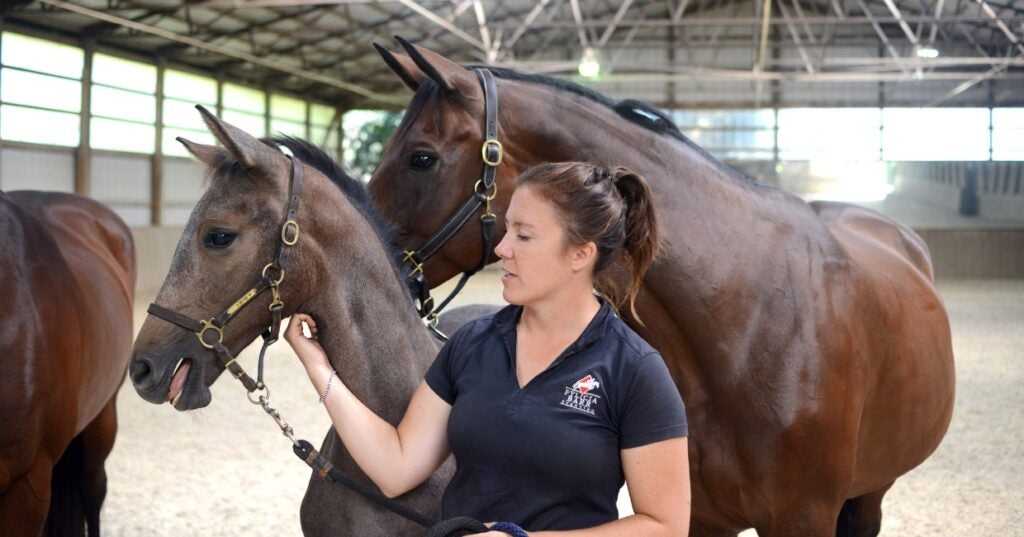PEARL-Penn Equine Assisted Reproduction Laboratory
Overview
Led by Katrin Hinrichs, DVM, PhD, DACT, the Harry Werner Endowed Professor of Equine Medicine and Chair of the Department of Clinical Studies-New Bolton Center, the Penn Equine Assisted Reproduction Laboratory (PEARL) performs both research and clinical work in equine assisted reproduction. The Laboratory conducts research into equine sperm capacitation (readiness for fertilization), oocyte maturation, intracytoplasmic sperm injection (ICSI), standard in vitro fertilization, and equine embryo development, and is one of the few laboratories in the United States performing clinical ICSI to produce foals from client mares and stallions. Dr. Hinrichs has pioneered research in these areas, producing the first foal from ICSI and embryo culture in North America in 2003, and the first cloned horse foal in North America in 2005.
Dr. Hinrichs’ research has established methods for equine assisted reproductive techniques that are now used clinically worldwide, including methods for successfully holding and shipping equine oocytes, for performing equine embryo biopsy, which allows genetic diagnosis of embryos before transfer to avoid production of foals with genetic diseases, and methods for successful vitrification (freezing) of expanded equine blastocysts, which allows embryos to be produced from older or valuable mares year-round while still supporting the production of foals that have early birth dates.
About Us
The goal of the Penn Equine Assisted Reproduction Laboratory is to provide answers for important clinical problems in equine reproduction, to allow breeders to optimize their breeding programs and to preserve exceptional equine genetics.
Clinical Services
Services provided by PEARL include:
- Intracytoplasmic Sperm Injection Program
- Cell Line Processing
- Equine Embryo Vitrification
- Embryo Biopsy for Genetic Diagnosis
All proceeds from the clinical service at PEARL go to support research on equine assisted reproduction in the Laboratory.
Publications
Genome activation in equine in vitro-produced embryos. Goszczynski DE, Tinetti PS, Choi YH, Hinrichs K and Ross PJ. Biol. Reprod. 106: 66–82 (2022).
Allele-specific expression analysis reveals conserved and unique features of preimplantation development in equine ICSI embryos. Goszczynski DE, Tinetti PS, Choi YH, Ross PJ and Hinrichs K. Biol. Reprod. 105:1416–142 (2021). Featured as BOR Editor’s Choice for December 2021 issue.
Factors affecting intracellular calcium influx in response to calcium ionophore A23187 in equine sperm. Sampaio B, Ortiz I, Resende H, Felix M, Varner DD and Hinrichs K. Andrology 9:1631-1651 (2021).
Culture protocols for horse embryos after ICSI: effect of myo-inositol and time of media change. Brom-de-Luna JG, Salgado RM, Felix MR, Canesin HS, Stefanovski D, Diaw M and Hinrichs K. Anim. Reprod. Sci. 233:106819 (2021).
Flow-cytometric analysis of membrane integrity of stallion sperm in the face of agglutination: the “zombie sperm” dilemma. Ortiz I, Felix M, Resende HL, Ramirez-Agámez L, Love CC and Hinrichs K. J. Assist. Reprod. Genet. 38:2465-2480 (2021).
Glucose concentration during equine in vitro maturation impacts mitochondrial function. Lewis N, Hinrichs K, Leese HJ, McG Argo C, Brison DR and Sturmey R. Reproduction 160:227-237 (2020).
Effect of warming method on embryo quality in a simplified equine embryo vitrification system. Canesin HS, Ortiz I, Nascimento Rocha Filho A, Salgado RM, Brom-de-Luna JG and Hinrichs K. Theriogenology 151:151-158 (2020).
Energy metabolism of the equine cumulus oocyte complex during in vitro maturation. Lewis N, Hinrichs K, Leese HJ, McG Argo C, Brison DR and Sturmey R. Sci. Rep. 10:3493, doi.org/10.1038/s41598-020-60624-z (2020).
Embryo development after vitrification of immature and in vitro-matured equine oocytes. Angel D, Canesin HS, Brom-de-Luna JG, Morado S, Dalvit G, Gomez D, Posada N, Pascottinie OB, Urregoa R, Hinrichs K and Velez IC. Cryobiology 92:251-254 (2020).

Questions?
If you have questions regarding the intracytoplasmic sperm injection (ICSI) program, please contact:
Kim Gleason
Embryologist & Equine ICSI Program Coordinator
For inquiries regarding aspiration of oocytes from live mares, shipping of ovaries post-mortem, or freezing or re-freezing of stallion semen for use in ICSI, visit the Reproductive Services page or call the New Bolton Center Hospital front desk, (610) 444-5800, and ask for the Reproduction clinician on call.
Address for shipments to PEARL
Department of Clinical Studies — New Bolton Center University of Pennsylvania
School of Veterinary Medicine
Penn Equine Assisted Reproduction Laboratory
382 West Street Road
Kennett Square, PA 19348

Moving Closer to ‘True’ Equine IVF for Clinical Use
Katrin Hinrichs, Harry Werner Endowed Professor of Equine Medicine, and colleagues developed a technique that would allow successful conventional in vitro fertilization (IVF) with horses.

From $500 Craigslist Castoff to Surprise Champion, Penn Vet’s Equine Assisted Reproduction Program Helps Create a Legacy
Fylicia Barr was a horse crazy kid with not much money but high hopes. Sunny was a wild young mare with no training – just a load of sass and…
